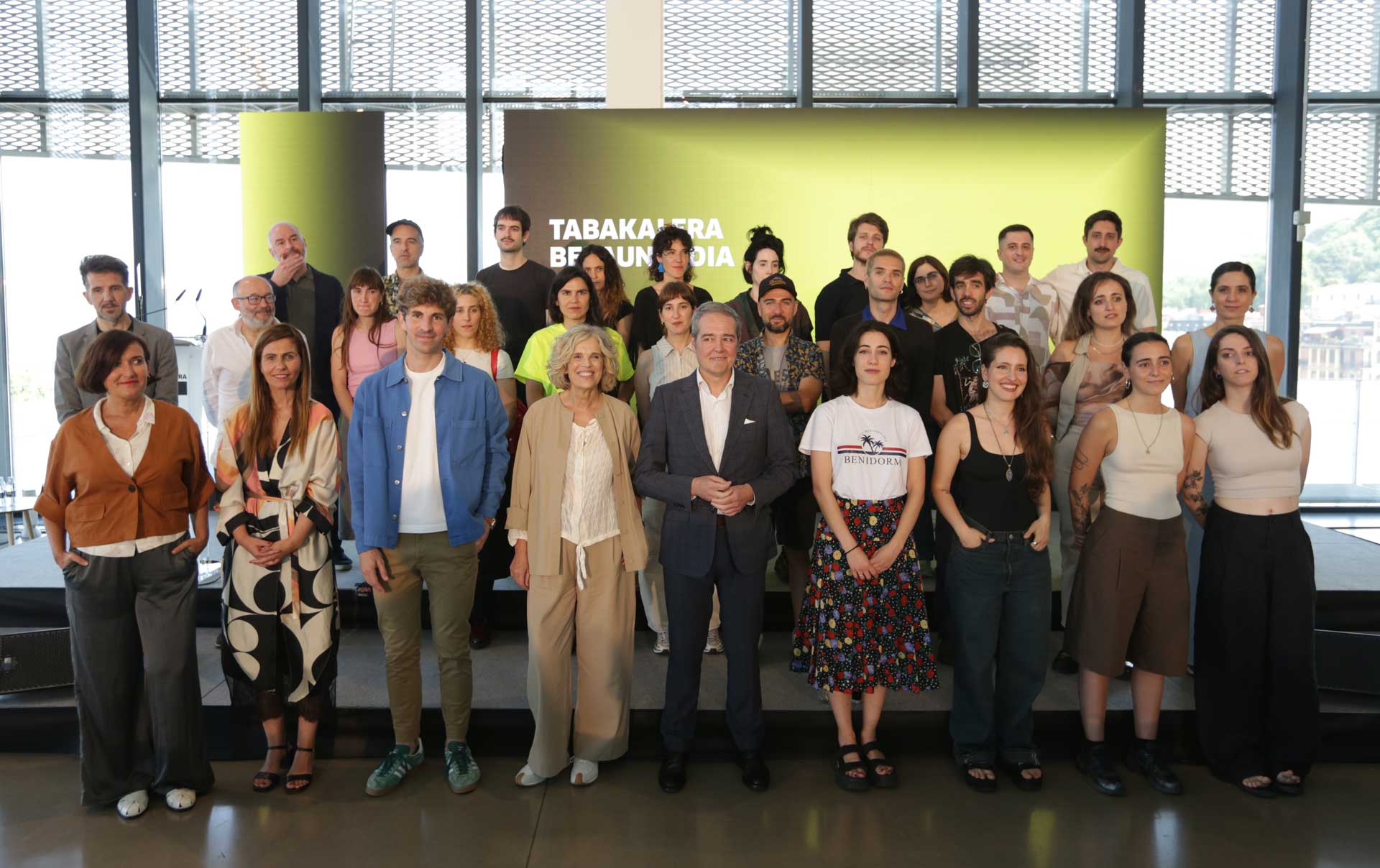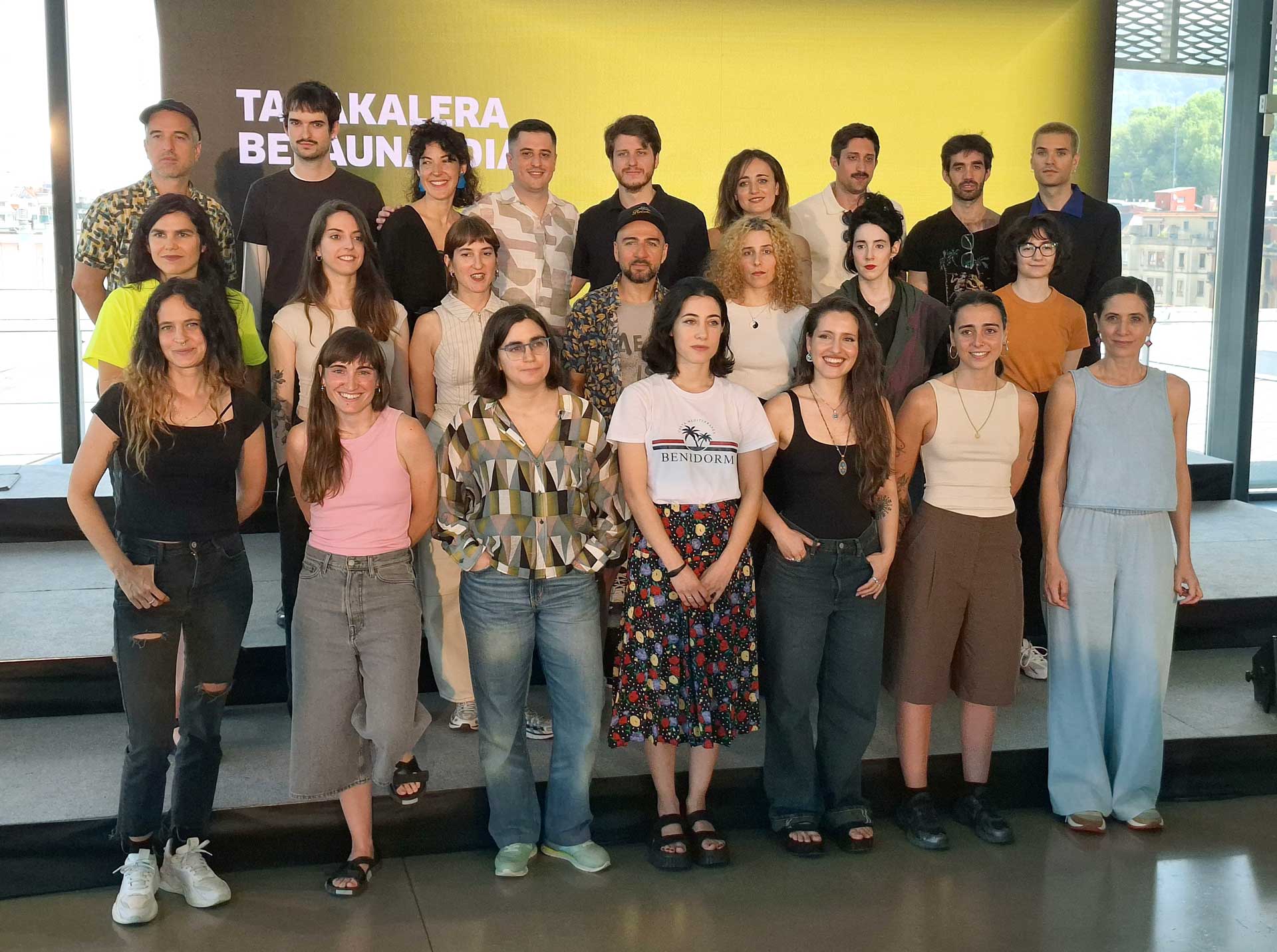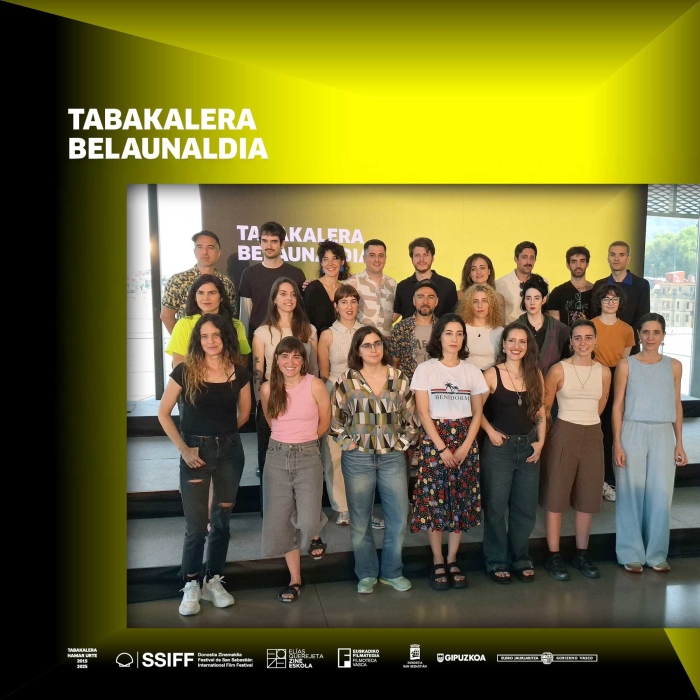The Tabakalera Generation has brought Basque cinema to major international festivals thanks to a unique ecosystem that promotes training, production, and exhibition
Four screenings will be offered today and tomorrow which are open to the public and which feature the participation of filmmakers in presentations and discussions
Today, at 12:00 noon, Tabakalera hosted a meeting of the Tabakalera Generation, a group of emerging filmmakers who have come to the fore in a unique cultural ecosystem. The event, held in Tabakalera's Prism, within the context of Tabakalera's 10th anniversary, was attended by prominent figures from the sector such as Edurne Ormazabal (General Director of Tabakalera), José Luis Rebordinos (Director of the San Sebastián Festival), Carlos Muguiro (Director of Elías Querejeta Zine Eskola), Joxean Fernández (Director of the Basque Film Archive), and Ibone Bengoetxea (Vice-Minister of Culture of the Basque Government). The presence of some thirty filmmakers from this generation —including Estibaliz Urresola, Mikel Gurrea, Maria Elorza, Maider Oleaga and Sara Fantova, among others, as well as important figures from the Basque audiovisual industry— highlighted the importance of the event, dedicated to recognising their careers and consolidating their international reach.


A unique ecosystem for contemporary Basque cinema
The Tabakalera Generation has established itself in the Basque Country as a clear example of a unique support system for contemporary cinema. This initiative is possible thanks to the collaborative efforts between the San Sebastián Festival, Elías Querejeta Zine Eskola, the Basque Film Archive, and Tabakalera, the international centre for contemporary culture — all with the essential support of Basque public institutions.
This creative support system has been carefully built over the years, adapting to the needs of the industry, and it has allowed for the creation of a fertile and sustained environment where filmmakers share not only work space and time but also processes and experiences, cultivating a mutually enriching creative and collaborative community.
A structured support system for creation
Tabakalera's audiovisual creation support programme is designed to assist each filmmaker from the initial stages of their project to its final festival presentation, allowing each individual to find their own path within the ecosystem. Many of the professionals that are part of the Tabakalera Generation today share a common path: training at the EQZE film school, developing their projects through programmes like Noka and Ikusmira Berriak with professional support, working on post-production at the Tabakalera Cinema and Audiovisual Lab, and presenting their films at major international festivals such as San Sebastián, Cannes, Venice, and the Berlinale. This process reflects a particular way of making films: a commitment to cinematographic creation over time, with a community of support and an international vocation.
To that end, the Elías Querejeta Zine Eskola film school has trained many of this generation's filmmakers since 2018. From an authorial, critical, and practical perspective, the school has fostered connections between filmmakers from different geographic locations and disciplines. Its students are in constant dialogue with the projects under development within the ecosystem, which favours the intermingling of different perspectives. Filmmakers like Marina Palacio, Mikele Landa, and Saioa Miguel have emerged from this space — a space which understands cinema as a collective process of thought and creation. And this year, Ernesto Martínez Bucio won the Best First Feature Award in the Perspectives section of the Berlinale with The Devil Smokes (and Saves the Burnt Matches in the Same Box), developed at EQZE.
Additionally, the Ikusmira Berriak and Noka programmes are fundamental pillars in this ecosystem, acting as key spaces for creative and collective support.
Since 2014, the Ikusmira Berriak residency and project development programme has supported the development of 50 film projects. Of these projects, 23 have premièred at international festivals, 16 have received awards, and the rest are still in development. Among the filmmakers who have participated in this programme are renowned Basque talents such as Jaione Camborda (Golden Shell at the San Sebastián Festival, 2023), Maria Elorza (TCM Youth Award, 2022), and Mikel Gurrea (Irizar Basque Film Award, 2022). Furthermore, at the national and international level, Ikusmira Berriak has featured filmmakers such as Elena López Riera, Elena Martín, Raven Jackson, Nele Wohlatz, Jessica Sarah Rinland, and Diego Céspedes, who recently won the award for best film in the Un Certain Regard section at the Cannes Film Festival with La misteriosa mirada del flamenco / The Mysterious Gaze of the Flamingo.
Since 2019, the Noka programme has provided support to 21 emerging female filmmakers. Testimony to said programme's success are figures such as Estibaliz Urresola, whose film 20.000 especies de abejas / 20,000 Species of Bees has garnered international awards and recognition at the Goya Awards and the Berlinale, and Sara Fantova, who received the Jury Special Mention at the Malaga Film Festival for Jone, Baztutean / Jone, Sometimes (2025). Promoted by the Basque Government and coordinated by Tabakalera in collaboration with Zineuskadi, Noka remains an essential platform for the visibility of new players in contemporary cinema.
Within this ecosystem promoting audiovisual creation, the 2deo Serieak programme has supported the development of 12 series projects and has established itself as a key space for experimentation and the search for new narrative formats in Basque. The programme, promoted by the Tabakalera Cinema and Audiovisual Lab in collaboration with the San Sebastián International Film Festival and EITB, reinforces the industry's commitment to innovation in the field of series.
Tabakalera, as an institution, aims to impact the audiovisual world in its broadest sense, offering artists the opportunity to challenge the medium's conventional boundaries and also explore the intersections between cinema and art and cinema and new technologies. Moreover, the contemporary culture centre constantly detects the challenges of the audiovisual sector and addresses them through experimentation and creative exploration. In this context, next September, filmmaker Irati Gorostidi will make the leap from film to exhibition, confirming once again the versatility of this generation — a generation which understands cinema not only as a format but also as an expanded artistic practice. Another recent example is that of Jaione Camborda, a filmmaker who participated with an immersive installation in Tabakalera's Quantum Visions exhibition.
The Basque Film Archive has also strengthened its role as an active institution within this ecosystem, facilitating access to heritage collections and establishing connections between contemporary cinema and audiovisual elements from days gone by. The Film Archive has played an essential role as a mediator between contemporary creation and audiovisual heritage.
Recognition of the pioneers
It is worth highlighting the previous work of players and spaces that paved the way before this moment of consolidation, such as Larrotxene, Sarobe, the Donostia Kultura Film Unit, and Kimuak. All these initiatives have helped create the conditions for us to speak today of a generation with a certain identity, ambition, and international reach: the Tabakalera Generation.
The Tabakalera Generation on the big screen
As part of the celebration, Tabakalera has prepared the Tabakalera Generation series of screenings, which will be held today and tomorrow (13 and 14 June). Programming includes four feature films and one short film carefully selected to illustrate both the formal richness and the successful trajectory of the collective of filmmakers who make up this promising generation. Tickets can be purchased at the Tabakalera Information Point or on the website.
-
Friday 13 June:
- 5:00 p.m. Historia de pastores (Story of Shepherds), by Jaime Puertas Castillo (Spain, 2024, 80'). Presentation and Q&A with the director.
- 7:00 p.m. Frialdad (Coldness), by Andrea Sánchez (Spain, 2024, 12') and Suro, by Mikel Gurrea (Spain, 2022, 116'). Presentation with the directors.
-
Saturday 14 June:
- 5:00 p.m. O Corno (The Rye Horn), by Jaione Camborda (Spain, Portugal, Belgium, 2023, 99'). Presentation with the director.
- 7:00 p.m. The Devil Smokes (and Saves the Burnt Matches in the Same Box), by Ernesto Martínez Bucio (Mexico, 2023, 81'). Presentation and Q&A with the director and co- writer and co-editor Karen Plata.
List of Basque filmmakers who are part of the "Tabakalera Generation":
Jaione Camborda, Estibaliz Urresola, Irati Gorostidi, Maddi Barber, Maider Oleaga, Mikele Landa, Maria Elorza, Marina Palacio, Mikel Gurrea, Amaia Merino, Aitor Merino, Maider Fernández, Arantza Santesteban, Aitziber Olaskoaga, Sara Fantova, Clara Rus, Itziar Leemans, Tamara Lucarini, María Inês Gonçalves, Andrea Sánchez, Ainhoa Gutiérrez del Pozo, Joana Moya, Nerea Castro, Zaira Zanguiti, María Monreal, Nagore Eceiza, David Pérez Sañudo, Arriguri, Asier Urbieta, Ainhoa Artetxe, Ainize Sarasola, Maria García Marraco, Maia Iribarne, Alba Lozano, Ione Atenea, Saioa Miguel.






